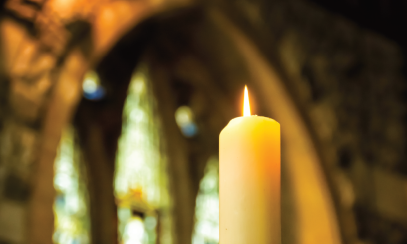
Do I really have to talk about Jesus?
Dear Father Joe: To be a good Christian witness, is it enough to be a good person – or do I have to talk about Jesus?
Thank you for your question: It’s an important one. Often, when we imagine ourselves talking about Jesus to co-workers or friends, it comes across as an uncomfortable requirement, instead of an organic reality that comes about from living our faith well. What I’d encourage us to do is get us out of the either/or idea and into the both/and.
Think of it this way: Being good is a symptom of Christianity, not the goal. Obviously, we should talk about Jesus, but it is important that we live in such a way as to give weight to our words when it’s time to speak them.
So, I’ll start by giving you some ideas as to how to be a good Christian witness with your actions, and then offer you tips as to how to talk about Jesus. Sound good? Let’s get to it.
First, we address our actions – being a “good person,” as you put it. I’ll begin by inviting us to see that at least part of the problem is the phrase “a good person.” Our standard for that qualification can be tragically low. I’ve actually had numerous people tell me, “I’m a good person: I’ve never killed anyone!” Ugh. Being a Christian witness is tough work. It is a spiritual and mental commitment on our part to guard and police our thoughts, words and actions so that they match up with Jesus’ thoughts, words and actions.
Here are some practical ways our actions can give good witness (this list is not exhaustive!):
A good Christian witness is prayerful. A Christian prays throughout the day. Pray before you leave the house in the morning. Pray while you are driving. Pray when you pass a police officer, fire truck or ambulance. Pray when you drive by a nursing home, hospital or hospice. Pray when you pass a cemetery. Pray when someone at work is getting clobbered. If someone tells you of sorrow or pain in their life, don’t just say, “I’ll pray for you” – do it right then. Simply say, “Jesus, be with this person; give them strength and healing.” A good Christian witness prays.
A good Christian witness is truthful. If you do something wrong, admit it and ask forgiveness.
A good Christian witness is humble. Don’t constantly list off your accomplishments or resume. Give credit to others where credit is due. Remember that all your gifts and talents come from God.
A good Christian witness is merciful. Withhold judgment concerning peoples’ motives. Recognize that you do not know what you do not know about a person’s circumstance or situation. Joyfully and easily offer mercy when someone apologizes or asks forgiveness. Be understanding.
A good Christian witness is sacrificial. Don’t make everything about you. Give more of your time, talent and treasure than is expected. Be willing to suffer joyfully for others.
A good Christian witness does not gossip. Refrain from participating in discussions about others; walk away when someone is getting trashed, or from the “conspiracy theories” at work, home, school and church.
A good Christian witness shares the best, not the worst. I have personally spoken to no small amount of people who have not or will not return to Church because of the angry Catholic posting on Facebook and the internet. Not everyone in the world needs to know our “family fights” in the Church. It is a scandal how we talk about our pope, our religious leaders and our local church. Share what is right and beautiful, refrain from constantly complaining.
As you read earlier, I’m not trying to make an exhaustive list. I’m trying to clear our hearts and minds of the idea that holiness is just about “being good” – it goes so far beyond that.
Think of it this way:
Like many priests, most days I find the obligations overwhelming. Most days, I have to battle my pride and simply acknowledge there is no way I can do all the things that need to be done. This process, I’ve learned, leads to me often looking and acting harried, and nothing about looking harried opens the door to people coming to me for help when they are in need.
I know another priest who always seems peaceful and tranquil. It blows me away when I see it, because he’s at least as busy as I am. So, when I see his manner and know his workload, the result is predictable: I asked him, “How do you do it?”
Evangelization works the same way.
When you and I live holy lives and hold ourselves to a ridiculous standard, it will set us apart, which is one way of defining the word “holy.” The result of a life of holiness? People come to us and ask, “How do you do that?”
This is your time to use your words and share Jesus. Think about your experience of Jesus in this moment. Think of why you choose to live for and love him. Think of why and how a relationship with him has made your life better. Think of these things because these will be your words. Not telling the person why they are wrong and you are right, not sharing doctrine (yet!) or apologetics, but sharing your relationship. Share your “why.”
This, my brothers and sisters, is how we present a good Christian witness to the world: first with your actions and then with your words.
May God bless our efforts to be holy.
Enjoy another day in God’s presence!



